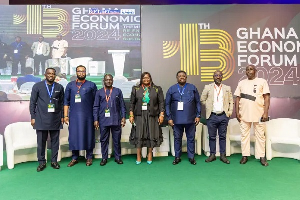Industry experts at the 13th Ghana Economic Forum (GEF), organized by the Business & Financial Times in Accra, reached a consensus that continuous government investment in the agricultural value chain is essential for translating key sector policies into tangible successes.
Speaking under the sub-theme, “Unlocking opportunities in the agriculture sector, forward-looking approach key to sustainable food supply and security”, a panel of agribusiness experts concluded that government’s effort in deepening interventions and policies be well targeted and situated to benefit farmers.
The issues of expensive food prices due to high food inflation, climate change resilience methods, land acquisition and data were discussed as key drivers of how government and policy makers can help farmers mitigate these concerns.
An agronomist and political activist, Dr. Abu Sakara, who was on the panel, argued that the country has the right opportunities to become food sufficient in various ways, but insisted that the current policy environment by subsequent governments towards agriculture is not encouraging.
What is the current cost of capital, interest rates? He asked, adding: “Agriculture needs a sector lending rate. Farmers cannot borrow at the current prevailing rates to turn the fortunes of the sector. This is a big disservice to the sector.”
He explained that the agriculture would continue to face challenges if government policy does not deliberately address and invest in irrigation, lending, infrastructure and land acquisition processes.
Meanwhile, Country Director of AGRA, Dr. Betty Annan, indicated that government needs to deepen collaboration with civil society organizations and developmental partners including AGRA, to deliver proving solutions and technology to smallholder farmers across the country.
“AGRA in the last 17 years has supported over 37 million farmers across Africa with the focus to collaborate with governments to create more resilience policies for farmers to mitigate climate change. Collaboration with private and knowledge partners are key to deepen investments in agriculture value chains” Dr. Annan said.
Equally, the CEO of Green Work Farm, John Amenu, who was also on the panel, explained that the over dependence on rainfed agriculture among majority of farmers make it difficult for key interventions, both by government and private sector, to yield the desired results.
“Extreme weather conditions and droughts impact on cost of land preparation and cost of seed. Farmers might plant but would not germinate due to lack of moisture in the sand. These are some of the factors that impact on land preparation,” he said.
Despite the sector’s ongoing challenges, Mr. Amenu emphasised the importance of the government creating an enabling environment and making the right investments to ensure its thriving.
For his part, the CEO of ESOKO, Daniel Asare Kyere, said data and information remain key ingredients in enabling farmers to have the right evidence and statistics to make decisions on cultivation.
“Unfortunately, the Ghanaian farmer continues to struggle for access to data. This is where ESOKO comes in. We support smallholder farmers to have access to commodity prices and through ESOKO’s agronomic advises, farmers are well informed to take good decisions. This is how we are trying to solve the problems. Nonetheless, it is not too late for government to prioritise data in order to help farmers make the right decisions,” Mr. Asare added.
Anthony Morrison, the CEO of the Chamber of Agribusiness Ghana (CAG), stated that effective investment in agricultural value chains requires the government to prioritise addressing post-harvest losses, developing local seed varieties, providing farmers with data and investing in technology, among other initiatives.
For instance, the CAG projects that technology involvement in agriculture is only at 13 percent and this is contributing to post harvest losses to the tune of more than US$600 million annually.
The 13th Ghana Economic Forum which was held on August 8, 2024, was on the broader theme, “Unlocking opportunities: re-engineering Ghana’s economic model for sustainable development”.
Business News of Monday, 12 August 2024
Source: thebftonline.com













